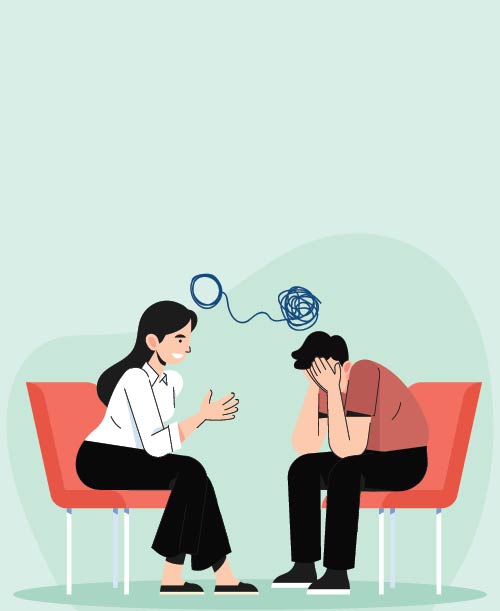The Importance of Mental Wellness: a Deep Dive Into Therapy, Treatment, and Their Benefits
Psychological health significantly shapes specific wellness, impacting thoughts, behaviors, and emotions. Therapy and therapy function as important opportunities for healing and personal growth. They offer organized support, aiding people navigate life's obstacles. Several remain not aware of the details kinds of treatment offered and their distinct advantages. Comprehending these elements is necessary for anybody considering professional mental health assistance. What complies with may brighten courses to resilience and satisfaction that several forget.
Recognizing Mental Health and Its Effect
Although mental health and wellness is usually overlooked, it plays an essential function in general well-being and everyday functioning. It includes psychological, mental, and social elements that affect just how people believe, really feel, and act. An individual's mental health and wellness directly affects their ability to take care of stress, associate with others, and choose. Poor mental wellness can lead to different problems, including anxiety, depression, and problem in keeping relationships, all of which can impede professional and personal growth.Furthermore, psychological wellness has far-ranging ramifications for physical health. Persistent stress and anxiety and neglected mental problems can add to numerous physical ailments, such as heart disease and compromised immune reactions. Conversely, favorable mental health fosters resilience, making it possible for individuals to manage life's difficulties effectively. Recognizing psychological health and wellness's significance is vital for cultivating encouraging atmospheres that promote emotional health, thus boosting the lifestyle for people and communities alike
The Various Sorts Of Therapy and Therapy
In the domain of psychological wellness, different counseling and therapy types accommodate diverse demands. Specific therapy techniques concentrate on personal concerns via individually sessions, while group treatment dynamics foster shared experiences and support among individuals. Recognizing these methods is essential for selecting the ideal intervention for different obstacles.
Specific Counseling Strategies
Numerous individual counseling approaches exist, each developed to resolve specific mental wellness concerns and deal with varying client demands. Cognitive Behavioral Treatment (CBT) concentrates on determining and changing unfavorable idea patterns, while Psychodynamic Treatment discovers unconscious procedures and previous experiences. Humanistic Therapy highlights individual development and self-actualization, promoting a helpful setting. Social Therapy (IPT) targets connection concerns and communication patterns to enhance psychological well-being. In addition, Acceptance and Dedication Therapy (ACT) motivates customers to accept their ideas and feelings while dedicating to personal worths. Each method uses special techniques and approaches, enabling professionals to tailor their techniques to the individual, thereby boosting the therapeutic experience and advertising psychological health healing.
Team Therapy Characteristics
Team therapy dynamics include various healing methods that leverage the power of shared experiences and social connections. This form of therapy typically includes diverse teams, promoting a safe atmosphere for individuals to reveal feelings and ideas. Secret types of group treatment include assistance teams, which give psychological support; process-oriented groups, concentrating on social communications; and psychoeducational teams, aimed at giving expertise about mental health and wellness concerns. The dynamics within these groups can boost self-awareness, as participants usually assess their actions in connection with others. Furthermore, group therapy promotes a feeling of belonging, minimizing sensations of seclusion. Through shared stories and collective analytical, individuals can create coping strategies and gain insights, inevitably adding to private development and healing.
The Role of Counseling in Mental Health And Wellness
Therapy plays an essential role in psychological wellness by offering various approaches customized to private demands. These techniques supply professional guidance that can lead to significant renovations in psychological well-being. Comprehending the different kinds of therapy can aid people make educated decisions concerning their psychological healthcare.

Types of Therapy Methods
While different therapy strategies exist, each offers distinct approaches and insights right into psychological health treatment - Cognitive Behavioural Therapy. Among the most famous are cognitive-behavioral therapy (CBT), which concentrates on altering adverse idea patterns; psychodynamic treatment, which discovers subconscious processes and childhood years experiences; and humanistic approaches, stressing personal growth and self-actualization. Additionally, solution-focused short therapy focuses on discovering options in the present instead of diving right into problems. Team treatment fosters community and shared experiences, while family treatment addresses relational characteristics within domestic frameworks. Each technique caters to different needs, aligning with specific preferences, problems, and therapeutic goals. Understanding these techniques aids clients make notified choices regarding their mental wellness journey and promotes efficient therapy tailored to their one-of-a-kind conditions
Advantages of Professional Guidance
Countless people benefit from professional advice in handling their mental wellness obstacles. Counseling provides a risk-free room for customers to explore their thoughts and feelings without judgment. This therapeutic atmosphere cultivates self-awareness, allowing people to identify patterns in their actions and develop healthier coping approaches. Specialist assistance also provides accessibility to evidence-based strategies that can reduce signs and symptoms of anxiousness, clinical depression, and other mental health issues. In addition, therapists can help in setting realistic objectives and offer assistance in accomplishing them, enhancing total wellness. The collaborative partnership between therapist and customer is crucial, as it promotes responsibility and encourages personal development. Eventually, specialist support plays an essential function in steering psychological wellness journeys, causing boosted psychological resilience and life satisfaction.
Benefits of Therapy: Healing and Growth

How to Choose the Right Therapist or Counselor
Just how can one browse the commonly frustrating process of choosing the best therapist or counselor? Determining individual requirements is essential; people must consider their certain concerns, whether depression, relationship, or anxiousness difficulties. It is beneficial to research study numerous restorative approaches, such as cognitive-behavioral treatment or psychodynamic therapy, to find an ideal match.Next, prospective customers ought to seek references from trusted sources or make use of online directory sites. It is important to assess Bonuses specialists' credentials, including their education and learning, licensing, and areas of field of expertise. Scheduling first examinations can aid evaluate compatibility, permitting people to examine interaction designs and personal comfort.Finally, logistical elements, such as place, schedule, and fees, should additionally be considered. By attentively weighing these aspects, one can make a notified choice, eventually promoting a healing connection that supports psychological wellness and individual growth.
Getting Over Preconception: Welcoming Mental Wellness Assistance
While social mindsets towards mental health have actually progressed, preconception still offers a significant barrier for lots of looking for assistance. This preconception typically manifests as misunderstandings surrounding psychological health problem, leading people to really feel embarassment or worry concerning their struggles. Lots of people think twice to seek counseling or treatment as a result of fret about being evaluated or labeled. Overcoming this stigma is basic for promoting an encouraging environment where people can openly review their mental health and wellness needs.Communities and organizations play an essential duty in this makeover by advertising recognition and education about mental wellness problems. Efforts that highlight personal tales can humanize these experiences, encouraging others to seek assistance without worry. As approval expands, individuals may really feel a lot more encouraged to embrace mental wellness assistance, recognizing it as an important element of general well-being. By taking apart stigma, society can cultivate a society of understanding, concern, and positive mental healthcare.
Strategies for Maintaining Psychological Health Outside of Treatment
Although click to read more treatment provides valuable support, preserving psychological wellness beyond sessions is just as essential. People can implement a number of methods to sustain their mental wellness. Routine exercise plays a necessary duty, as workout promotes the launch of endorphins, which enhance mood. Additionally, a well balanced diet regimen abundant in nutrients can greatly impact psychological security and energy levels.Practicing mindfulness and reflection assists individuals manage anxiety and establish greater self-awareness. Developing a regular rest routine is also essential, as quality remainder is vital for cognitive function and emotional regulation.Engaging in social activities cultivates connection and reduces feelings of seclusion. Pursuing rate of interests or leisure activities can supply an innovative outlet and boost self-esteem. Practicing and establishing reasonable objectives self-compassion allows individuals to cultivate durability. By integrating these techniques into every day life, individuals can successfully sustain their psychological well-being beyond therapy sessions.
Frequently Asked Concerns

Just How Can I Inform if I Required Therapy?

Establishing the requirement for therapy typically entails acknowledging persistent feelings of unhappiness, stress and anxiety, or overwhelming anxiety. If everyday functioning ends up being tough or coping mechanisms fall short, seeking professional assistance may be a useful step onward.
What Should I Anticipate in My Very First Treatment Session?
In the very first therapy session, individuals can expect an intro, conversation of their factors for looking for help, and a review of the therapist's strategy, creating a foundation for future conversations and establishing convenience in the healing area.
Are Online Therapy Sessions as Effective as In-Person Ones?
Study shows that online treatment sessions can be as reliable as in-person ones. Variables such as the therapist's credentials, client involvement, and the therapeutic connection greatly influence end results, despite the medium used.
Can Therapy Assist With Connection Concerns?
Treatment can help individuals in dealing with partnership issues by supplying tools for communication, comprehending emotions, and solving disputes. Marriage Counselling. It promotes healthier characteristics and urges personal growth, ultimately cultivating more powerful, a lot more satisfying connections between partners
For How Long Does Therapy Normally Last?
Therapy duration varies significantly based on specific demands and goals. Normally, sessions may last from a couple of weeks to a number of months, with some people taking part in continuous treatment to deal with long-lasting worries and personal development. Cognitive Behavioral Therapy (CBT) concentrates on recognizing and changing negative idea patterns, while Psychodynamic Treatment checks out past experiences and unconscious procedures. Key types of team treatment include assistance groups, which offer psychological assistance; process-oriented teams, focusing on interpersonal communications; and psychoeducational groups, intended at passing on knowledge about psychological health and wellness issues. Amongst the most prominent are cognitive-behavioral treatment (CBT), which concentrates on altering adverse thought patterns; psychodynamic treatment, which explores subconscious processes and youth experiences; and humanistic approaches, highlighting individual development and self-actualization. Team treatment cultivates community and shared experiences, while family members treatment addresses relational dynamics within familial frameworks. It is helpful to research study different restorative strategies, such as cognitive-behavioral therapy or psychodynamic treatment, to locate a suitable match.Next, possible clients ought to look for references from trusted resources or make use of online directory sites.